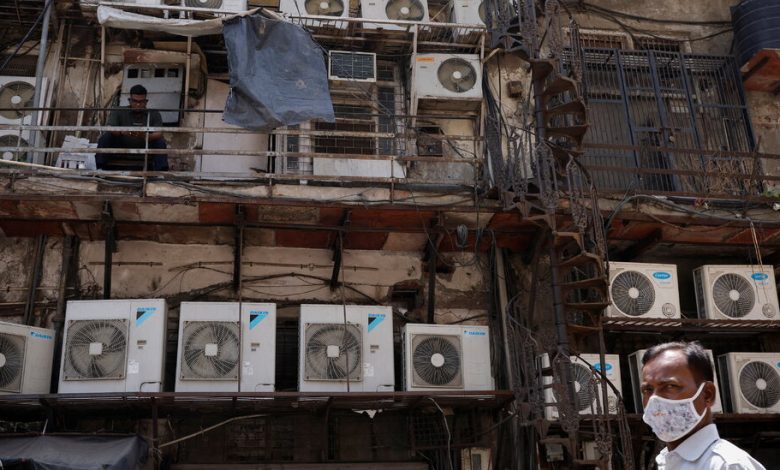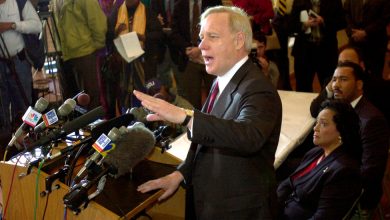Senate Ratifies Pact to Curb a Broad Category of Potent Greenhouse Gases

WASHINGTON — The Senate voted on Wednesday to approve an international climate treaty for the first time in 30 years, agreeing in a rare bipartisan deal to phase out of the use of planet-warming industrial chemicals commonly found in refrigerators and air-conditioners.
By a vote of 69 to 27the United States joined the 2016 Kigali Amendment, along with 137 other nations that have agreed to sharply reduce the production and use of hydrofluorocarbons, or HFCs. The chemicals are potent greenhouse gases, warming the planet with 1,000 times the heat-trapping strength of carbon dioxide.
Senator Chuck Schumer of New York, the majority leader, called the ratification “a historic step forward to combating global warming in a huge way.” He predicted that the vote may count as one of the most important bipartisan accomplishments during this Congress. Twenty-one Republicans joined all present members of the Democratic caucus to approve the treaty, including Senator Mitch McConnell of Kentucky, the minority leader.
“Ratifying the Kigali Amendment, along with passing the Inflation Reduction Act, is the strongest one-two punch against climate change any Congress has ever taken,” Mr. Schumer said, referring to last month’s passage of the nation’s first major climate change law, which pumps $370 billion into expanding wind and solar energy and electric vehicles.
If the Kigali pact is successfully implemented, scientists estimate it would prevent up to 0.5 degrees Celsius, or roughly 1 degree Fahrenheit, of warming by the end of this century. At this stage in the planet’s rapid warming, every fraction of a degree makes a difference.
Average global temperatures have risen 1.1 degrees Celsius compared with preindustrial times. Scientists have said an increase beyond 1.5 degree Celsius significantly increases the likelihood of catastrophic climate impacts.
On a practical level, the vote changes little in the United States because Congress and the Biden administration have already enacted policies to reduce the production and importation of hydrofluorocarbons in the United States by 85 percent over the next 15 years, and industry has turned to alternative chemicals.
But ratification of the treaty, which the United States helped to secure in the waning days of the Obama administration, carries symbolic weight and adds momentum at a time of heightened action on climate change in Washington.
“This treaty shows that it’s not hopeless to solve climate change,” said Durwood Zaelke, president of the Institute for Governance & Sustainable Development, a Washington-based research and advocacy organization.
The Biden Administration’s Environmental Agenda
- Inflation Reduction Act: The new law, which invests billions into climate and energy programs, represents America’s largest investment to fight climate change.
- Climate Team Changes: John Podesta, who led the Obama White House on climate strategy, will oversee $370 billion in clean energy funds as Gina McCarthy, President Biden’s top climate adviser, gets ready to step down.
- Executive Action: Following his signing the climate bill, Mr. Biden is planning a series of measures to further reduce greenhouse gas emissions.
Mr. Zaelke said the approach of curbing a greenhouse gas through a relatively narrow sector of the economy, in this case refrigeration and air-conditioning, could be a template for future agreements. “It shows the way forward by taking a bite out of the climate problem,” he said.
The vote came on a day when President Biden told the United Nations General Assembly that the United States would continue to press ahead with climate action, reversing four years of stagnation under President Donald J. Trump. Under Mr. Trump, the United States became the only nation to withdraw from the 2105 Paris Agreement, the global pact intended to reduce planet-warming fossil fuel pollution.
“From the day I came to office, we have led with a bold climate agenda,” Mr. Biden told the assembly in New York, noting that he rejoined the Paris Agreement and brokered a commitment last year among countries representing 65 percent of global G.D.P. to restrain average global temperature rise.
After passage last month of the Inflation Reduction Act, Senate ratification of the Kigali agreement gives Mr. Biden another example to assuage world leaders skeptical about whether the United States can follow through on its climate pledges.
The Kigali agreement was an amendment to the Montreal Protocol, the landmark 1987 treaty designed to repair the ozone layer by banning coolants called chlorofluorocarbons, or CFCs, that were thinning the layer. The ozone is a part of the Earth’s atmosphere that absorbs harmful ultraviolet light from the sun.
Chemical companies responded to the 1987 agreement by developing HFCs, which do not harm the ozone layer but have turned out to be a significant driver of global warming. More than a dozen states have either banned or restricted HFCs.
Reducing HFCs became the unusual climate policy to earn support from both the environmental community and industry and trade groups that typically fight climate measures. Those include the National Association of Manufacturers, the American Chemistry Council, and the United States Chamber of Commerce.
Many American manufacturers had a business incentive to support the amendment. Under the pact, nations that do not ratify the amendment will have restricted access to expanding international markets starting in 2033.
Some Republicans from states with many chemical manufacturers supported the Kigali deal.
Senator John Kennedy, Republican of Louisiana, teamed with Senator Tom Carper, the Delaware Democrat who leads the Senate Environment Committee, to call for approval of the pact.
“Ratification of the Kigali Amendment will further open up global markets to American-made products and will allow the federal government to further prevent illegal Chinese dumping of HFCs in the United States, which hurts U.S. businesses,” the senators wrote in a statement this year.
In 2020 Congress passed the American Innovation and Manufacturing Act, which directs the Environmental Protection Agency to set new rules on HFCs, which begin to take effect this year, and will gradually reduce the production and importation of hydrofluorocarbons in the United States by 85 percent over the following 15 years.
About 15 percent of HFCs would still be permitted because they have critical uses for which alternatives do not yet exist. Under the Kigali Amendment, industrialized nations like the United States and those in the European Union will reduce production and consumption of HFCs to about 15 percent of 2012 levels by 2036.
Much of the rest of the world, including China, Brazil and all of Africa, will freeze HFC use by 2024, reducing it to 20 percent of 2021 levels by 2045.
The Senate approved a Republican amendment to classify China as a developed nation, which would put it on the same HFC phaseout timetable as other developed countries, removing any competitive advantage it would have over American manufacturers. It directs the secretary of state to propose that change at a future meeting of the signatories to the Montreal Protocol.
A small group of the world’s hottest countries — like Bahrain, India, Pakistan, Iran, Saudi Arabia and Kuwait — have the most lenient schedule, freezing HFC use by 2028 and reducing it to about 15 percent of 2025 levels by 2047.
Republicans who opposed the pact argued that those provisions created an unequal playing field for American companies.
Senator John Barrasso of Wyoming, the ranking Republican on the Senate Energy Committee, who supported the 2020 law requiring a new domestic HFC regulation, voted against ratification. “There is no excuse for any senator to give China a handout at the expense of the American taxpayer and American hardworking families,” he said in a speech on the Senate floor before the vote.
Americans for Prosperity, a political action committee founded by the billionaire Koch brothers, sent a letter to lawmakers last week saying that ratifying the Kigali Amendment would be an “abdication of U.S. sovereignty over environmental regulation” to the United Nations. The group also argued it would raise the price of air-conditioning, refrigeration, and industrial cooling for American consumers.
But Francis Dietz, a spokesman for the Air-Conditioning, Heating and Refrigeration Institute, an industry trade group, disputed that. He said the phase-down of HFCs was happening, no matter what the Senate did about the formal treaty ratification.
“We’ve been preparing for this for more than a decade,” he said, adding, “If you’re a consumer, this isn’t going to make any difference to you whatsoever.”
Emily Cochrane contributed reporting.



